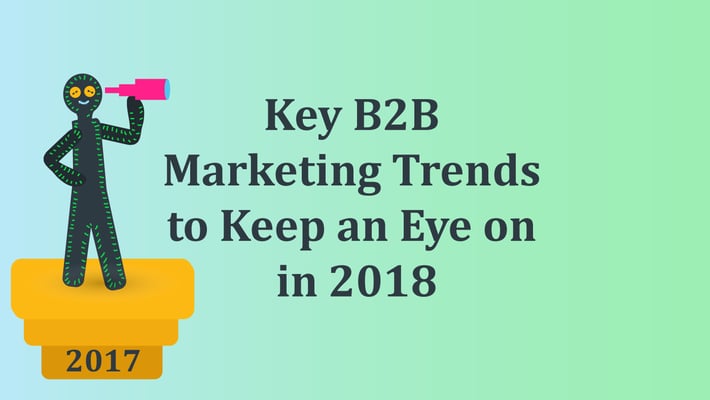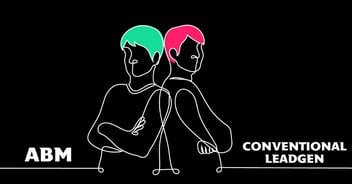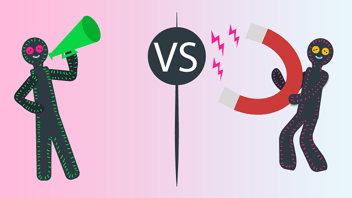
Key B2B Marketing Trends To Keep An Eye On In 2018
Reading time: 7 very informative minutes
Curious as to what the new year has in store for B2B marketing? Experts predict that this will be the year of Account Based Marketing (ABM). Of course, AI-based marketing and social media videos are still firmly on that upward trajectory. Needless to say, the GDPR is also poised to make a big impact on B2B marketing and the way we manage customer data. How can you prepare yourself to fully capitalize on the opportunities that 2018 brings, and what are some of the challenges that you need to take note of? Read on!
Probably the biggest buzzword of 2017 across the board has been AI. B2B marketing has also caught the artificial intelligence bug, with discussions of how AI will transform consumer behavior, marketing, advertising and analytics in the near future.
For B2B marketers this meant utilizing a host of affordable and easy-to-use advanced data analytics tools. These stimulated the use of rich and extensive datasets for marketing decision making and catalyzed data-driven approaches in marketing. Platforms such as Sisense, Clicktale and many others gained ever wide acceptance, insights were everywhere.
We expect this trend to continue. With AI technologies driving better accuracy in sales intelligence, there will be an increase in personalized, data-driven marketing for both B2B and B2C.
Marketing Automation
In addition, last year marketing automation platforms such as Hubspot, Marketo, Eloqua have become increasingly commonplace. According to smartinsights, 482,765 websites were using marketing automation technology last year, with HubSpot leading the pack with 21% market share; Marketo seems to be the preferred tool for large enterprises. This is not surprising, as marketing automation is now understood as a must-have tool in a B2B marketer’s toolbox.
Influencer marketing
Already well entrenched in the B2C world, influencer marketing is now making its stance with B2B marketing. The role of “technology evangelist” is becoming increasingly important in technology-driven B2B marketing world. And for a good reason. To market a product to a highly technical audience, a deep understanding of the underlying technology is essential. Marketing ‘fluff’ is not going to work here. Technical experts are increasingly deployed to strengthen marketing efforts of technology driven enterprises. The marriage between ‘techies’ and marketers is ever more important for effective marketing.
Social media marketing changes
And last but not least, B2B social media marketing is now, more than ever, centered around video and interactive content. The time is rife for B2B marketers think seriously about video content as part of their social marketing and here is why.
- 73% of B2B marketers say video positively impacts ROI
- 75% of business executives watch work-related online video on a regular basis
- 59% of senior executives prefer video over text if given an option for both
- YouTube is rated the fourth most effective B2B channel marketers use behind Email, LinkedIn and Print.
When it comes to social media, it’s clear: video is here to stay. Some 70% of B2B marketers report that video converts prospects better than other formats; in addition to this, 65% of decision makers have taken interest in a business solution after watching a video. CEO of Vidyard, Michael Litt, claims that , the Play button is the “most compelling call to action on the web”.
But that’s not say that you need to restrict yourself to the generic webinars that immediately comes to mind when you think of B2B video content - there are tons of other ways that B2B marketers can utilize videos.
Here is one example of B2B marketers who rock video content. HubSpot is known for their cutting-edge marketing efforts, but their team also excels at multi-format B2B video marketing. HubSpot YouTube channel overflows with guides, case studies, how-tos, weekly podcasts, case studies and customer testimonials.
The secret to success? Their video content is well integrated into their overall sales funnel, with great video content for each stage of buyers journey. Another thing B2B marketers can learn from HubSpot is to not shy away from niche and industry specific content. In the end, for most B2B marketers videos that drive conversions should be prioritized over the views.
Getting ready for 2018 with Account Based Marketing
Account Based Marketing (ABM) has been around for quite a while, and is by no means a new phenomenon. However, it’s definitely become a lot more popular lately among B2B marketers, and for good reasons.
Essentially, ABM is a strategic form of B2B marketing. Companies identify target accounts and engage with specific employees with highly targeted sales and marketing efforts. This approach acknowledges that in many organizations, several (specific) people/employees are involved in the decision making process to purchase new products and services. So targeting only one specific function with generic messaging and offers which may or may not be worthy to him/her is inherently less effective. Companies utilizing an ABM approach are no longer focusing on casting a wide net to target as many prospects as possible at the top of the funnel - instead, they’re honing in on a select number of prospects.
Justin Gray, the CMO of LeadMD claims that, “Our definition of account-based marketing is just good marketing. If you only had one prospect to sell and market to, you would treat them with the same principles as outlined in ABM. It’s just aiming at a more well-defined area of that funnel, and treating your best buyers in a much more personal way.”
In 2018, we expect companies and their marketing budgets to be more targeted. This does not mean leaner budgets by any stretch, same budgets will be spent on more targeted accounts. The definitions of MQLs, SQLs and opportunities or, middle and bottom of the funnel marketing, will become of the only real indicators of successful campaigns.
AI and Machine Learning
AI will continue to shake up the B2B marketing world as we know it in 2018 - by empowering us with the data and tools we need to fine-tune our marketing messages and personalize them for each prospect.
One example? With AI, marketers can implement real-time content targeting which produces 20% more sales opportunities. Here’s how it works: using AI algorithms, a company might learn that a specific buyer who logs into LinkedIn on Monday mornings has recently started researching CRM tools. Following this, the AI software will select highly targeted articles on the topic which will be published on the days and times when the prospect is the most active on LinkedIn.
The General Data Protection Regulation (GDPR)
The GDPR will come into force in May 2018 and all companies who store the personal data of EU citizens must adhere to the new guidelines, or risk being slapped with heavy fines.
To ensure that you’re fully compliant with the GDPR, we recommend taking the following steps:
- Meeting with key decision makers and stakeholders in your company and to get everyone up to speed on what the new regulations entail
- Updating your lead generation forms with double opt-in
- Going through your existing databases and removing all information which was obtained by non GDPR compliant methods
- Updating your privacy and cookie consent policies
- Ensuring that you’re only collecting data that is essential to have, and that you’re processing it in a way that’s compliant with the GDPR
- Appointing a Data Protection Officer
For more details, view our CMO’s GDPR Checklist.
A final word on B2B marketing trends in 2018
We could go on… but you are all busy marketers. Immense opportunities are waiting for the daring marketers who adopt new technologies and mind-sets and utilize all tools that are available at their fingertips. To learn more about what you can do in 2018 to succeed with your B2B marketing efforts, contact us for a free consultation!






